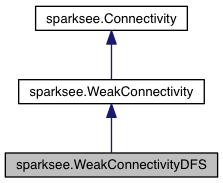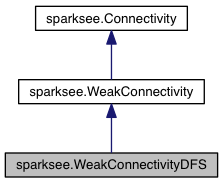WeakConnectivityDFS class. More...


Public Member Functions | |
| def | __init__ (self, session) |
| Creates a new instance of WeakConnectivityDFS. More... | |
| def | exclude_nodes (self, nodes) |
| Set which nodes can't be used. More... | |
| def | add_all_edge_types (self) |
| Allows connectivity through all edge types of the graph. More... | |
| def | get_connected_components (self) |
| Returns the results generated by the execution of the algorithm. More... | |
| def | run (self) |
| Executes the algorithm. | |
| def | add_edge_type (self, type) |
| Allows connectivity through edges of the given type. More... | |
| def | exclude_edges (self, edges) |
| Set which edges can't be used. More... | |
| def | add_node_type (self, t) |
| Allows connectivity through nodes of the given type. More... | |
| def | set_materialized_attribute (self, attribute_name) |
| Creates a new common attribute type for all node types in the graph in order to store, persistently, the results related to the connected components found while executing this algorithm. More... | |
| def | add_all_node_types (self) |
| Allows connectivity through all node types of the graph. | |
| def | close (self) |
| Closes the Connectivity instance. More... | |
| def | is_closed (self) |
| Gets if Connectivity has been closed or not. More... | |
Detailed Description
WeakConnectivityDFS class.
This class can be used to solve the problem of finding weakly connected components in an undirected graph or in a directed graph which will be considered as an undirected one.
It consists in finding components where every pair (u,v) of nodes contained in it has a path from u to v and from v to u. This implementation is based on the Depth-First Search (DFS) algorithm.
It is possible to set some restrictions after constructing a new instance of this class and before running it in order to limit the results.
After the execution, we can retrieve the results stored in an instance of the ConnectedComponents class using the getConnectedComponents method.
Check out the 'Algorithms' section in the SPARKSEE User Manual for more details on this.
Constructor & Destructor Documentation
| def sparksee.WeakConnectivityDFS.__init__ | ( | self, | |
| session | |||
| ) |
Creates a new instance of WeakConnectivityDFS.
After creating this instance is required to indicate the set of edge types and the set of node types which will be navigated through while traversing the graph in order to find the weak connected components.
- Parameters
-
session [in] Session to get the graph from and calculate the connectivity
Member Function Documentation
| def sparksee.WeakConnectivityDFS.add_all_edge_types | ( | self | ) |
Allows connectivity through all edge types of the graph.
In a weak connectivity the edges can be used in Any direction.
| def sparksee.WeakConnectivityDFS.add_edge_type | ( | self, | |
| type | |||
| ) |
Allows connectivity through edges of the given type.
In a weak connectivity the edges can be used in Any direction.
- Parameters
-
type [in] Edge type.
| def sparksee.WeakConnectivityDFS.add_node_type | ( | self, | |
| t | |||
| ) |
Allows connectivity through nodes of the given type.
- Parameters
-
t null
|
inherited |
Closes the Connectivity instance.
It must be called to ensure the integrity of all data.
| def sparksee.WeakConnectivityDFS.exclude_edges | ( | self, | |
| edges | |||
| ) |
Set which edges can't be used.
This will replace any previously specified set of excluded edges. Should only be used to exclude the usage of specific edges from allowed edge types because it's less efficient than not allowing an edge type.
- Parameters
-
edges [in] A set of edge identifiers that must be kept intact until the destruction of the class.
| def sparksee.WeakConnectivityDFS.exclude_nodes | ( | self, | |
| nodes | |||
| ) |
Set which nodes can't be used.
This will replace any previously specified set of excluded nodes. Should only be used to exclude the usage of specific nodes from allowed node types because it's less efficient than not allowing a node type.
- Parameters
-
nodes [in] A set of node identifiers that must be kept intact until the destruction of the class.
| def sparksee.WeakConnectivityDFS.get_connected_components | ( | self | ) |
Returns the results generated by the execution of the algorithm.
These results contain information related to the connected components found as the number of different components, the set of nodes contained in each component or many other data.
- Returns
- Returns an instance of the class ConnectedComponents which contain information related to the connected components found.
|
inherited |
Gets if Connectivity has been closed or not.
- See also
- close()
- Returns
- TRUE if the Connectivity instance has been closed, FALSE otherwise.
| def sparksee.WeakConnectivityDFS.set_materialized_attribute | ( | self, | |
| attribute_name | |||
| ) |
Creates a new common attribute type for all node types in the graph in order to store, persistently, the results related to the connected components found while executing this algorithm.
Whenever the user wants to retrieve the results, even when the graph has been closed and opened again, it is only necessary to create a new instance of the class ConnectedComponents indicating the graph and the name of the common attribute type which stores the results. This instance will have all the information related to the connected components found in the moment of the execution of the algorithm that stored this data.
It is possible to run the algorithm without specifying this parameter in order to avoid materializing the results of the execution.
- Parameters
-
attribute_name [in] The name of the common attribute type for all node types in the graph which will store persistently the results generated by the execution of the algorithm.
 1.8.11
1.8.11